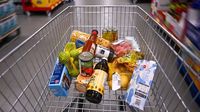BRUSSELS (AP) — The European Union on Wednesday urged its 450 million citizens to stockpile food, water, and other essentials to last at least 72 hours as the continent grapples with rising threats from geopolitical tensions, cyberattacks, climate change, and disease. This call to action comes amid increasing concerns about war and natural disasters, with NATO Secretary-General Mark Rutte warning that Russia could be capable of launching another attack in Europe by 2030.
During a press conference, Preparedness and Crisis Management Commissioner Hadja Lahbib unveiled a new strategy aimed at bolstering the EU's crisis readiness. "Today’s threats facing Europe are more complex than ever, and they are all interconnected," she stated, emphasizing the importance of ensuring that citizens have essential supplies ready for emergencies. Lahbib listed items like food, water, flashlights, ID papers, medicine, and shortwave radios as crucial components of a survival kit.
The EU's initiative reflects a growing recognition of the need for enhanced preparedness across member states. The strategy encourages countries to build up a "strategic reserve" of critical resources, including firefighting planes, medical supplies, and equipment to counter chemical, biological, radiological, and nuclear threats. This approach mirrors similar preparedness measures already in place in countries like France, Finland, and Sweden.
In recent years, the EU has faced numerous challenges, from the COVID-19 pandemic to Russia's military aggression in Ukraine, which has underscored the need for a robust response to potential crises. Lahbib noted that the EU should no longer rely on ad hoc reactions to emergencies, stating, "We can no longer rely on ad hoc reactions." Instead, the commission aims to harmonize protocols and spur action among member states.
As part of the new strategy, the EU has directed national governments to roll out measures that ensure citizens and essential services like schools and hospitals are better equipped to handle possible future crises. This includes adapting school curricula to include preparedness lessons and establishing a national preparedness day to raise awareness.
Roxana Minzatu, an EU commissioner for preparedness, emphasized the importance of citizens knowing how to react in various emergency situations. "You need to know how to act — how to react — if the power goes off, if there's an earthquake, if there is a massive flood, or there's any type of threat. How do you protect yourself? What resources do you need? How do you yourself take responsibility?" she explained.
The EU's preparedness plan also involves opening a centralized "crisis coordination hub" and boosting shared EU stockpiles of critical goods, such as vaccines and transport equipment. Additionally, the commission has proposed EU-wide training drills to enhance civil and military cooperation in times of crisis.
While the EU has laid out its vision for improved preparedness, the execution of these measures will largely depend on individual member states. The readiness to handle disasters varies significantly across the bloc, with some countries, like Finland, often regarded as models of emergency preparedness. Finland maintains underground shelters for potential bombing or nuclear threats and has a national emergency supply agency dedicated to securing critical goods.
Emma Hakala, a researcher at the Finnish Institute of International Affairs, noted that while Finland is well-prepared for certain risks, it may not be as equipped for environmental challenges. "We're not quite as well prepared for environmental risks as we think we are," she said. However, she added that the general sentiment in Finland remains positive regarding preparedness.
As threats to the EU's security continue to rise, many citizens are increasingly aware of the potential risks they face. An EU official stated, "I wouldn't say that we have an acute threat of a military attack, but of course, we consider Russia to be much more of a concrete threat than we used to." The official highlighted that climate risks have also become a significant concern, given the recent flooding and extreme weather events across Europe.
Lahbib pushed back against accusations that the EU was spreading unnecessary fear, stating, "Being aware of risks and preparing for them is the opposite of creating panic and irrational actions like we may have seen during the [COVID-19] pandemic." She referenced the panic buying that occurred during the early days of the pandemic, urging citizens to focus on informed preparedness rather than fear-driven responses.
In addition to practical measures, the EU's strategy aims to foster a culture of preparedness among citizens. Lahbib asserted, "Ready for anything – this must be our new European way of life." The commission's action plan includes developing guidelines for achieving a minimum self-sufficiency of 72 hours among the population, ensuring that citizens are equipped to handle crises effectively.
As the EU embarks on this new preparedness initiative, the focus will be on fostering a proactive mindset among citizens and authorities alike. The EU's commitment to improving crisis management and enhancing the resilience of its member states could play a crucial role in navigating the complexities of modern threats. By encouraging citizens to stockpile essential supplies and prepare for emergencies, the EU is taking significant steps towards ensuring the safety and well-being of its population in an increasingly uncertain world.







